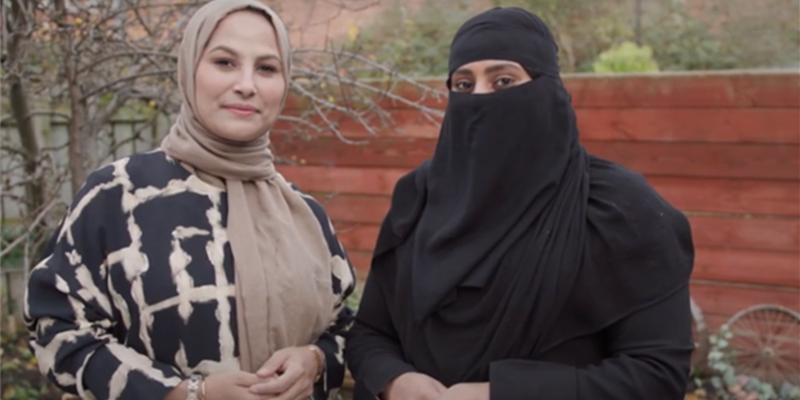
Nahida & Saddiya speak in their Mother Tongue Sylheti, a dialect of Bengali, to talk about some of the cultural stigmas when faced with a cancer diagnosis.
This video is part of Macmillan’s mother tongue project. (3 minutes and 54 seconds). We hope to feature different lived experiences here on the Online Community to represent different ethnic cultures and communities, so nobody feels they are facing cancer alone.
Please see an English transcript written below. There are also English subtitles available when watching the video. For additional support information in other languages, scroll see the 'Additional support information' section at the bottom of this page.
Saddiya: People are afraid to use the word cancer in our Community. They immediately panic the moment they hear the word.
Nahida: I even noticed that whenever we use the word “cancer” in front of my mother, she would say, “why are they saying things like that?” or “It’s not good to say things like that”.
Saddiya: They become scared the moment they hear the word cancer. They say things like “oh my life’s over now”, “That’s the end for me”.
Nahida: So how can we change that mentally and understand the situation better?
I’m Nahida, BAME Macmillan Project Coordinator at Sunderland Bangladesh International Centre.
Saddiya: My name is Saddiya. I’m a Support Worker and Carer at Sunderland Bangladesh International Centre. I first got to know Nahida when I did an adult care course with her and after that when I got into the Macmillan project, I shared my case study with her.
Well ever since I was a kid, maybe fourteen or fifteen, I have been a carer for my father. When your parents cannot speak English, you basically become a parent for your parents. Because they feel that if I am able to speak English, or anyone else is, we’ll have a better idea of how everything works.
They can feel that person knows what’s good for their health, and what medicine will be best for them. They are fully dependent on that person.
Nahida: I think in the case of my grandmother, everybody that took her to the doctor, all of them have broken English. So, all of them have a language barrier. So, my grandmother wanted someone who was born here, to take her to the doctor as they would be able to explain her symptoms to the doctor better.
So, I told the doctor that she had been having the same problem for five or six years. She has difficulty swallowing. They said they won’t be able to help because of her age. She was crying like a baby. So obviously I had to push the doctors. It took five years for us to get here and for them to finally run tests.
After they did that, when they did the biopsy, they later told us that they found a tumour. But Alhamdulillah (all thanks to Lord), because of her treatments, she’s back to being normal. She was able to fight it.
Saddiya: When my mother was at the hospital, at times, she would do things such as wrapping herself completely with the blanket or covering her head with it. Or she would just be distressed or feel anxious. So, the nurses would have no clue what she was going through.
So, when I would go and see that her headscarf is not on her, or her body was not covered properly, she would feel bothered by that. So, I had to tell them about all the things that she would need. What services and things they could provide for us, for my mother. So, it’s really important to ask for what you think is necessary for you.
If you ask them questions or for help, you’ll definitely be supported.
Nahida: We basically have to tell people that they shouldn’t be afraid because this isn’t a disease that you can catch from somebody else.
Saddiya: A lot of the time, if they feel they have lumps or pain in their bodies, they don’t tell anyone out of fear of going to the doctor. So because a lot of patients downplay their symptoms, people tend to ignore them as well. And it is not as if when you have cancer, life is over.
Nahida: Yeah, in the case of my grandmother, people say that once you’re over 80, there no more treatments for you.
Saddiya: But after the treatment (Alhamdulillah (all thanks to Lord), she’s able to somewhat return to her old life.
Nahida: being normal again.
Saddiya: Living a normal life again. I feel that if we all get together, we can change and improve services, and also help our Community build more confidence and give them knowledge about how certain things work or have an effect.
Every time I help anyone, I feel good knowing I made a difference in someone’s life.
If you’d like to be a guest blogger for the Online Community and share your personal experiences in Macmillan’s Community news blog, please email Community@macmillan.org.uk.
Whatever cancer throws your way, we’re right there with you.
We’re here to provide physical, financial and emotional support.
© Macmillan Cancer Support 2026 © Macmillan Cancer Support, registered charity in England and Wales (261017), Scotland (SC039907) and the Isle of Man (604). Also operating in Northern Ireland. A company limited by guarantee, registered in England and Wales company number 2400969. Isle of Man company number 4694F. Registered office: 3rd Floor, Bronze Building, The Forge, 105 Sumner Street, London, SE1 9HZ. VAT no: 668265007